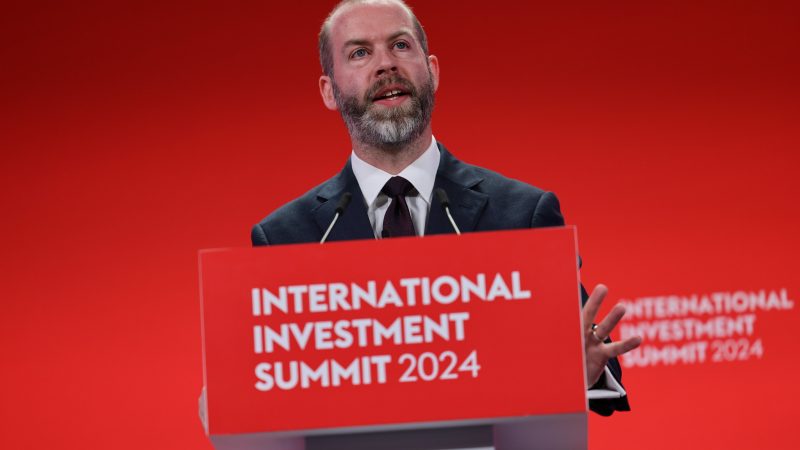
The government has inherited economic plans that will starve Britain of the investment it desperately needs. To fix this requires stimulating new sources of capital for investment and making Britain a much easier place to invest in. Both require decisive action.
The Investment Summit was a promising start. As the curtain rose, a welcome £50bn commitment from the private sector was unveiled alongside a publicly stated belief from global business leaders that Britain is a country worth investing in. That is the prize that comes with stability. But stimulating investment isn’t a day-long event. It must be central to the government’s long-term agenda.
‘Promising signs from Labour’s planning reform’
There are welcome signs on this front especially with planning and pension reform. Labour has rightly recognised that Britain is too slow to build, hung up on an outdated planning system. It now takes an average of four years to secure planning consent for major national infrastructure, almost double what it was a decade ago. This has increased costs by 30 percent.
The government has made positive steps by broadening the scope of critical infrastructure, unlocking a faster-paced consent process and this shift – away from a system of local consent where the loudest voices shut down development to one of national consent for key projects – should be extended to other developments. At the same time, AI can be integrated into technical systems to speed up the actual assessment of applications.
A British pension ‘superfund’
Progress is also being made on reforming Britain’s pension funds. These are potential firestarters for Labour’s growth mission but generations of Britons are suffering because their savings are trapped in small, inefficient pension funds. At the same time, large overseas pension funds invest 16 times more in British private equity than domestic pensions do. Both retirees and the economy have suffered as a consequence.
Government should move at pace to incentivise Britain’s 5,200 defined benefit pension fund to combine into a £400bn superfund that can compete on the world stage – and invest in Britain. This would challenge the likes of Canadian superfunds which already own London’s fibre broadband rollout, Associated British Ports and airports in Birmingham, Bristol and London City. The end game is a series of multi-billion pound funds based in Britain, investing in Britain.
‘Freeing up space for extra investment’
Pension and planning reform will create the conditions to make the UK more attractive for investment. The Chancellor also has the opportunity to modernise the rules and structures of our economy, deepening the pools of capital available to invest in the UK’s prosperity. This should start with the government’s fiscal rules in the upcoming budget.
Left unchanged, the government’s debt rule will constrain it from borrowing more to invest and undermine its central mission of driving growth. If Labour were to do nothing and stick to inherited plans, net investment would fall by seven percent per year in real terms over the course of this Parliament, equivalent to a £13.5bn cut in cash terms by 2028/29.
This would be a grim reckoning for public services when the NHS alone faces a £37bn capital shortfall. In an age where two-thirds of Britons believe their country is in decline, it would be fuel for anger-absorbing populism on the left and the right. More public sector investment has to be unlocked.
This can be achieved by switching from the current measure of debt, which is quite narrow, to a broader measure that also accounts for the government’s financial assets – including student loans, equity in homes on the help-to-buy scheme and bailed-out companies. This would create space for up to £52bn in extra investment each year, based on the Office for Budget Responsibility’s March forecasts.
To avoid a negative market reaction and to ensure a sufficient reserve buffer to deal with unforeseen circumstances, not all of this headroom should be used at once. But even just using half of it would represent a transformative sum that could reshape Britain’s future.
‘How to make it easier to invest in Britain’
Finally, there is more to be done to make it easier to invest in the UK. This includes the actual trading mechanisms for stocks and shares. London was once the world’s largest stock exchange but today it ranks sixth.
A new, government-led ambition to become the premier public exchange for high-growth tech companies in Europe backed by bold and broad-ranging reform, could boost the investment going into British start-ups, and make the country an attractive home for innovators. But rather than enticing new firms, a remarkable 76 companies delisted from the London Stock Exchange’s (LSE) growth fund, AIM, last year. This fund should be merged with the main stock exchange, creating an investor-enticing fast-track scheme for high-growth companies in the tech sector.
Getting this right is critical, because when we invest in Britain, we invest in its people. In their health and happiness, their education and skills.
SHARE: If you have anything to share that we should be looking into or publishing about this story – or any other topic involving Labour– contact us (strictly anonymously if you wish) at [email protected].
SUBSCRIBE: Sign up to LabourList’s morning email here for the best briefing on everything Labour, every weekday morning.
DONATE: If you value our work, please donate to become one of our supporters here and help sustain and expand our coverage.
PARTNER: If you or your organisation might be interested in partnering with us on sponsored events or content, email [email protected].




More from LabourList
Economic stability for an uncertain world: Spring Statement 2026
‘Biggest investment programme in our history’: Welsh Labour commit to NHS revamp if successful in Senedd elections
James Frith and Sharon Hodgson promoted as government ministers